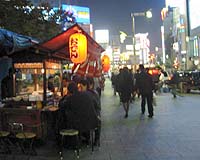 |
Natori, Japan (AFP) March 27, 2011 The furnaces are burning again at the tsunami-battered crematorium in Natori, where workers face a grisly backlog of bodies from Japan's worst natural disaster in nearly a century. Since the March 11 tsunami that slammed into Japan's northeast coast, priority has been given to repairing facilities, like this one, that are needed to help deal with the disaster's human cost. Despite severe damage to the buildings at the coastal crematorium, on Saturday the roar of kerosene burners filled its cold hall for the first time since the disaster. A bereaved family carefully placed charred bone fragments of two brothers onto silver trays using ceremonial chopsticks, while marks on the walls showed where seawater rose to the ceiling two weeks earlier. The giant wave, triggered by a 9.0-strength earthquake, claimed more than 10,000 lives, including at least 600 people in Natori where a further 800 are still missing. The sensitivities of the family members attending Saturday's cremation had to contend with further repair work, as workmen drilled holes and hammered broken plaster off the walls. The bodies of Ren Kashiwagi, 19, and his little brother Itaru, 16, were found in a swamped field close to their home, nearly a week after the tsunami surged into Natori city. Their parents, two remaining brothers, and an elderly grandmother silently passed the scorched bones to a master of ceremonies who placed them in funeral urns wrapped in orange cloth. "After we have finished the cremation, we will be able to take the ashes with us. This gives us some peace," the boys' father, Yoshinori Kashiwagi, told AFP. "It's happened now, so there isn't much I can do but think about the future for those of us in the family who are left behind," Kashiwagi said. His family is currently sheltering in an evacuation centre, with little hope of a move to temporary housing any time soon. Relatives and teenagers in school uniforms stood smoking and chatting in quiet clusters outside the battered crematorium during the 90 minutes it took for the bodies to burn. Four more cremations were scheduled on the same day, and engineers were hoping that the other two furnaces in the plant would be working in about a week. Like dozens of other towns on Japan's Pacific coast, Natori has struggled to cope with a mounting backlog of decomposing corpses, recovered from mangled cars, drowned paddyfields and flattened houses. Japanese usually cremate their dead, and the Kashigawi family were among those fortunate enough to observe the normal rituals for the two brothers. Others have had no choice but to watch their lost relatives buried in mass graves, with an official promise that they will be exhumed and cremated properly at a later date. Three workers at the Natori crematorium had narrowly escaped the tsunami by climbing onto the roof of the building, where they remained trapped for a day and a night until the waters receded. "The first bodies came the day after the tsunami, then the dead started piling up one by one and we had to keep revising our estimate," said municipal environmental official Bin Kimura. The city opened a disused bowling alley as a makeshift morgue, where coffins were lined up across the bowling lanes. The manager at the crematorium, Shunji Hariyu, said he had originally thought the facility would be out of action for months. "There were massive broken tree trunks in the reception room, and the concrete wall of another building had smashed through the offices," Kariyu said. "But the priority was to get the cremations started -- we had to do everything we could. The first thing we did was to tidy up," he added. The city brought in the services of a specialist furnace company from Toyama prefecture. "I'd never seen such a badly damaged crematorium," said one company employee who also repaired furnaces in Kobe, after the 1995 quake that killed some 5,000 people, and Hokkaido where a 1993 tsunami left more than 200 dead. He had reported for duty a day after the tidal wave hit, sleeping in his car and in office rooms for the past fortnight as a team worked round the clock to crank up the burners. "A cremation gives people a chance, whether they've just lost a child, or a parent, to put things to rest. That's how a cremation helps the living," he said.
Share This Article With Planet Earth
Related Links Bringing Order To A World Of Disasters A world of storm and tempest When the Earth Quakes
 Hotels deserted in Tokyo amid nuclear scare
Hotels deserted in Tokyo amid nuclear scareTokyo (AFP) March 24, 2011 The immense and usually bustling entryway of the luxurious Imperial Hotel in the heart of Tokyo is now dimly lit and nearly empty, save for 15 staff waiting to greet guests who are unlikely to arrive. Tokyo's hotels have emptied since Japan's quake-tsunami disaster, with some forced to shut down as foreigners flee, locals stay home and businesses scrap meetings and conferences under the shad ... read more |
|
| The content herein, unless otherwise known to be public domain, are Copyright 1995-2010 - SpaceDaily. AFP and UPI Wire Stories are copyright Agence France-Presse and United Press International. ESA Portal Reports are copyright European Space Agency. All NASA sourced material is public domain. Additional copyrights may apply in whole or part to other bona fide parties. Advertising does not imply endorsement,agreement or approval of any opinions, statements or information provided by SpaceDaily on any Web page published or hosted by SpaceDaily. Privacy Statement |